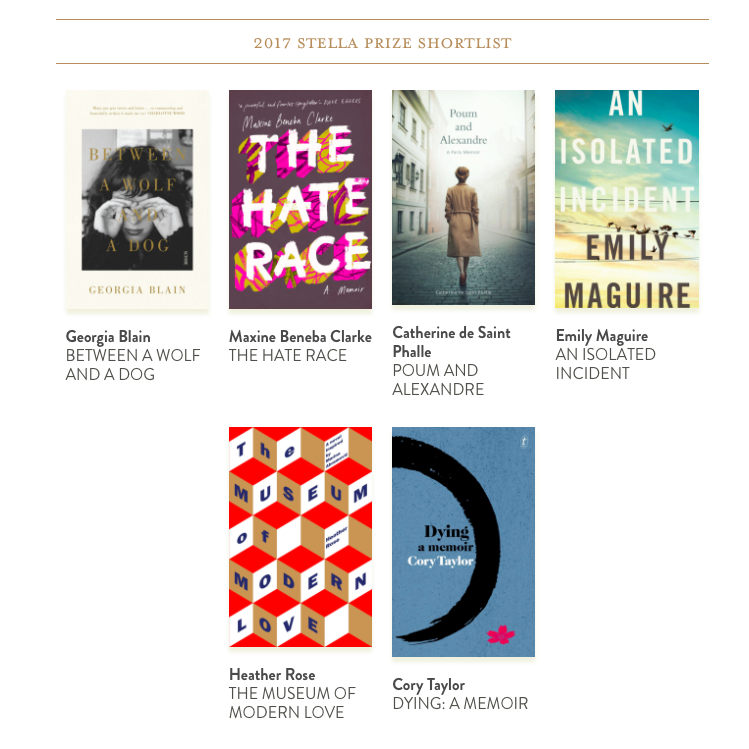Wow, what a week! The Museum of Modern Love won the 2017 Stella Prize last week. It was awarded in Melbourne at The Arts Centre. I cannot express how extraordinary this recognition is for a novel that took 11 years to complete. Here is a link to the transcript of my speech on the night, the speech of the beloved Brenda Walker (such a wonderful novelist and Chair of Judges) and the magnificent words of the Susan Carland. Plus some pictures of the big event.
I am so deeply grateful to the National Australia Bank for a prize of great generosity. And to The Stella Prize team who have been impeccable in their creation and staging of this annual Prize. Beyond the gift of time that the prize money affords me, the encouragement to continue with my writing is priceless.
http://thestellaprize.com.au/prize/2017/

Heather & Allen & Unwin publisher Jane Palfreyman

Benjamin Law, Sandra Phillips, Heather Rose, Brenda Walker, Diana Johnston, Delia Falconer

Stella Winner 2016 Charlotte Wood & Heather Rose

The Stella Prize was established in 2011 when a group of bold, brave women took the step of acknowledging that Australian women writers were being under-represented in the books reviewed and the prizes that were awarded. For example, in 2011, 70% of books reviewed in the Weekend Australian newspaper were written by men. And the ultimate literary prize in Australia, the Miles Franklin – the legacy prize of one of Australia’s great writers (and a woman) – had only been won by a female author 10 times in the 54 years it had been awarded. So the Stella Prize was born.
It’s hard to express how meaningful it can be to have the books we write acknowledged by a wider circle of people. Publishing is not a world awash with funds to promote books. For literary writers, the most we can usually hope for is a good review in a major newspaper. But that doesn’t always happen. Sometimes the support of enthusiastic distributors and bookshop staff can promote a book, or a lucky invitation to a writer’s festival. Sometimes there are rare moments that see our works transformed into films or plays or video games. Almost as rare is the sale of our work into foreign countries. Invitations to festivals are not easy to come by. I have attended one major festival. It was with my first novel – White Heart – at Sydney Writer’s Festival. That was in 1999. Festival budgets do not stretch to flights and accommodation for largely unknown authors from far flung regions of Australia. And there’s the catch. Without publicity we cannot achieve sales. Without sales we cannot forward our careers.
British publishers do not generally pick up novels already printed in Australia. US publishers are just as tough. And even when we are picked up, there are rarely any royalties that flow beyond the initial (and sometimes quite modest) advance. The average advance in Australia for a novel is $5000.
Prize money is a gift of time. Prize money is so rare! Any money for writing is rare! And every prize has different eligibility criteria. Because The Museum of Modern love is set in New York, with no reference to Australia at all, it is ineligible for the Miles Franklin which is only for books that ‘present Australian life in any of its phases.’
Writing is hard work. It requires enormous focus and stillness. It requires creating an almost meditative space where we can convey the story that is urgently trying to flow through us. That urgency can obliterate all other thoughts. It is devastated by interruption. It is dissuaded by a failure in the writer to just sit down and do the work.
Writing takes time. Because it is very rare for Australian writers to earn any substantial income from their work (currently the average income for Australian writers is $13,000 pa) we must then do our work around other work. Writing a novels usually takes years. That’s years where writers have to choose writing before the other demands of life. In my experience what gives is socialising, movie-going, tv watching, gardening, cooking, renovating, reading, sleep and any other number of ways we humans spend our time.
So it’s something of a miracle when, after many years of work, a book with it’s own special life beyond the clandestine world of the author’s mind and the author’s computer, finds its way onto a major prize shortlist. And the Stella shortlist is a huge boon. It will have a significant impact on the number of readers who discover a book. It gives the book a profile that opens up the possibility of sales into other countries and other mediums. For a little while we ride on a bubble of acknowledgement. And it’s precarious. Like a flower in bloom. We know there are other days ahead, other cycles to come. So it’s important to celebrate.
I think for most of us writers, it’s always a surprise to receive widespread acknowledgment for our creative efforts. This fragile idea that came to visit, that was gathered up and written down and worried over for months and years and became a novel or a work of non-fiction or a prose or poetry collection, is the result of a kind of fight against all the odds. If the book gets published that is the first miracle. If it attracts a shortlisting for a major prize that is another miracle. There are so many good writers and good books.
So thank you Stella judges for whittling down your longlist to a Stella shortlist 2017 that includes The Museum of Modern Love. I am enormously and profoundly grateful.

Stella shortlist 2017